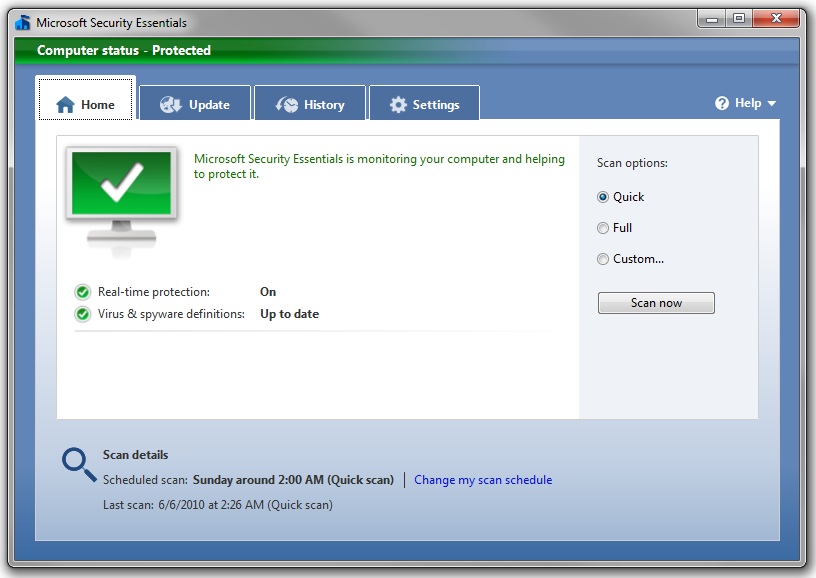Microsoft AV Software Finally Beats the Big Boys
AV-TEST awarded Microsoft top marks in keeping PCs safe, provided that you're still running Windows 7.
Microsoft’s built-in security software has had some ignominious lows and modest highs over the last few months. But it seems that the company is finally entering the realm of the best antivirus software — at least on Windows 7.

The latest round of testing from Madgeburg, Germany-based evaluation firm AV-TEST awarded Microsoft top marks in keeping PCs safe. To be fair, however, no product really fell short of the mark this time around.
This information comes from AV-TEST’s website, where the company displays the results of evaluations of 18 different antivirus programs for Windows 7. The service ranked each program out of a possible 18 points, with six points apiece for protection, performance and usability.
A score of 17.5 or 18 earned a coveted Top Product recommendation; any score of 10 or more was sufficient for an overall recommendation, however. (This time around, no product scored below a 14.5.)
Coming in at the top of the list were AhnLab V3 Internet Security, Kaspersky Lab Internet Security and Trend Micro Internet Security, each with a perfect score. Just below them were Comodo Internet Security, McAfee Internet Security, Microsoft Security Essentials and Symantec Norton Security, each with 17.5 points. (Most of these are also makers of the best Android antivirus apps.)
McAfee and Microsoft are newcomers in this sphere, since until recently they tended to rank much lower in most AV-TEST appraisals.
At the opposite end of the spectrum was F-Secure Safe, with a still-respectable 14.5. The program actually provided nearly perfect security; its major downfall was in usability, which means that its navigation was not up to snuff. K7 Computing TotalSecurity, Microworld eScan Internet Security Suite and PC Pitstop PC Matic also squeaked by with 15.5 points, but there was nothing egregious enough in their scores to recommend against them strongly.
Sign up to get the BEST of Tom's Guide direct to your inbox.
Get instant access to breaking news, the hottest reviews, great deals and helpful tips.
Somewhere in the middle were Avast Free Antivirus, AVG Internet Security, Avira Antivirus Pro, Bitdefender Internet Security, BullGuard Internet Security, G Data InternetSecurity and VIPRE Security VIPRE AdvancedSecurity. They all scored between 16 and 17 points, making them functional, but, by AV-TEST standards, unremarkable.
Microsoft Security Essentials' big move on up hasn't quite been mirrored by its Windows 8.1 and Windows 10 equivalent, the built-in Windows Defender. That product, an expanded version of MSE, has gradually been getting better in AV-TEST's Windows 10 evaluations (it used to be at the very bottom), but has never achieved a perfect protection score.
However, Windows Defender did ace the latest round of tests by rival lab AV-Comparatives, located across the Grenze in Austria. Windows Defender on Windows 10 blocked 100 percent of "real-world" malware in the February evaluations, matching the perfect scores of F-Secure, Kaspersky and Trend Micro.
The AV-TEST results show that these stellar Microsoft showings seen by both labs weren't a fluke, and lead us to wonder if the days of paid antivirus software for home users may be numbered, especially on the very secure Windows 10.
Still, Windows 7 has a couple of years of life left in it, especially for users with older, less powerful machines, like secondary laptops. (Its last security update is scheduled for Jan. 14, 2020.)
Old machines require security protection just as much as, and arguably even more than, newer devices. (Even Macs require the best Mac antivirus software.) It’s good to know that even if you don’t want to spring for fancy security software, your system is unlikely to run afoul of anything really bad — as long as you exercise some common sense online, of course.
Marshall Honorof is a senior editor for Tom's Guide, overseeing the site's coverage of gaming hardware and software. He comes from a science writing background, having studied paleomammalogy, biological anthropology, and the history of science and technology. After hours, you can find him practicing taekwondo or doing deep dives on classic sci-fi.
-
mdd1963 Defender actively and successfully blocked my severe Trojan threat (known as Amazon Drive) cloud storage software the other day...awesome! :)Reply -
Phillip Corcoran Reply20847984 said:Twelve folks are going to be very happy..! :)
You evidently don't realise just how popular (and often preferred over Win10) Windows 7 is even today.
-
mdd1963 When Win10 first came out in Beta, I also preferred Windows 7 as well...Reply
Several months later, after it's official release, I upgraded/installed it, and, for the most part, after a few tweaks on suppressing this, enabling that, turning this off, etc., it 'pretty much' looked like Win7 with a quick access search bar....w/ different popup method for search, but, I normally just enter the first two-three characters of what I wish to do/run instead of clutter the desktop with shortcuts....
Works great....
Put a few 'must have' shortcuts in the taskbar, off and running flawlessly.
(I don't understand the 'Keep Win7 until my tomb' crowd, but,...let them keep it if they like it)
Of course, I'd be running CentOS or Linux Mint were it not for Battlefield 1! :)

